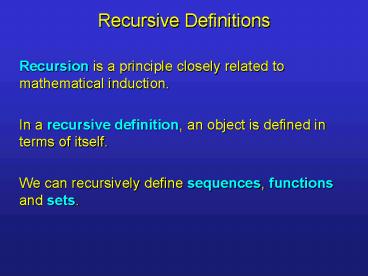Recursive Definitions - PowerPoint PPT Presentation
1 / 15
Title:
Recursive Definitions
Description:
procedure gcd(a, b: nonnegative integers with a b) if a = 0 then gcd(a, b) := b ... procedure fibo(n: nonnegative integer) if n = 0 then fibo(0) := 0 ... – PowerPoint PPT presentation
Number of Views:80
Avg rating:3.0/5.0
Title: Recursive Definitions
1
Recursive Definitions
- Recursion is a principle closely related to
mathematical induction. - In a recursive definition, an object is defined
in terms of itself. - We can recursively define sequences, functions
and sets.
2
Recursively Defined Sequences
- Example
- The sequence an of powers of 2 is given byan
2n for n 0, 1, 2, . - The same sequence can also be defined
recursively - a0 1
- an1 2an for n 0, 1, 2,
- Obviously, induction and recursion are similar
principles.
3
Recursively Defined Functions
- We can use the following method to define a
function with the natural numbers as its domain - Specify the value of the function at zero.
- Give a rule for finding its value at any
integer from its values at smaller
integers. - Such a definition is called recursive or
inductive definition.
4
Recursively Defined Functions
- Example
- f(0) 3
- f(n 1) 2f(n) 3
- f(0) 3
- f(1) 2f(0) 3 2?3 3 9
- f(2) 2f(1) 3 2?9 3 21
- f(3) 2f(2) 3 2?21 3 45
- f(4) 2f(3) 3 2?45 3 93
5
Recursively Defined Functions
- How can we recursively define the factorial
function f(n) n! ? - f(0) 1
- f(n 1) (n 1)f(n)
- f(0) 1
- f(1) 1f(0) 1?1 1
- f(2) 2f(1) 2?1 2
- f(3) 3f(2) 3?2 6
- f(4) 4f(3) 4?6 24
6
Recursive Algorithms
- An algorithm is called recursive if it solves a
problem by reducing it to an instance of the same
problem with smaller input. - Example I Recursive Euclidean Algorithm
- procedure gcd(a, b nonnegative integers with a lt
b) - if a 0 then gcd(a, b) b
- else gcd(a, b) gcd(b mod a, a)
7
Recursive Algorithms
- Example II Recursive Fibonacci Algorithm
- procedure fibo(n nonnegative integer)
- if n 0 then fibo(0) 0
- else if n 1 then fibo(1) 1
- else fibo(n) fibo(n 1) fibo(n 2)
8
Recursive Algorithms
- Recursive Fibonacci Evaluation
9
Recursive Algorithms
- procedure iterative_fibo(n nonnegative integer)
- if n 0 then y 0
- else
- begin
- x 0
- y 1
- for i 1 to n-1
- begin
- z x y
- x y
- y z
- end
- end y is the n-th Fibonacci number
10
Recursive Functions
- Example
- procedure factorial(n nonnegative integer)
- if n 1 then factorial (1) 1
- else
- factorial(n) nfactorial(n-1)
11
Recursive Functions
- procedure power(x integer, n integer)
- if n 0 then power (x, 0) 1
- else
- power (x, n) xpower(x, n-1)
12
Merge Sort
- Merges two sorted lists in linear time with the
procedure Merge()
procedure Merge(L1, L2 Lists) L empty list
while L1 and L2 are both nonempty begin
remove smaller of first element of L1 and L2 from
the list it is in and put it at the left end of
L if removal of this element makes one list
empty then remove all elements from the other
list and append them to L end
13
Merge Sort
procedure mergesort(L a1, a2an List) if n gt
1 then m _n/2_ L1 a1, a2am
L2 am1, am2an L merge(mergesort
(L1), mergesort(L2)
14
Recursive Algorithms
- For every recursive algorithm, there is an
equivalent iterative algorithm. - Recursive algorithms are often shorter, more
elegant, and easier to understand than their
iterative counterparts. - However, iterative algorithms are usually more
efficient in their use of space and time.
15
Homework
- P. 283 1, 2, 3, 4, 10































